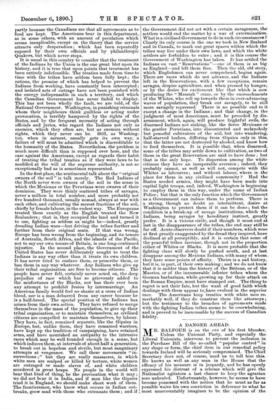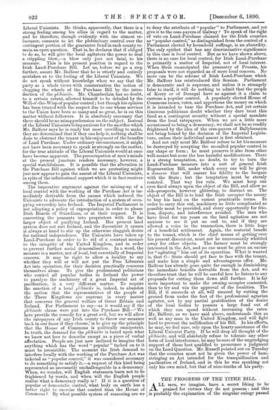A DANGER AHEAD.
MR. BALFOUR is on the eve of his first blunder. Unless the Unionist Party, and especially the Liberal Unionists, intervene to prevent the inclusion in the Purchase Bill of the so-called " popular control" in any shape or form, the chief item in our remedial policy towards Ireland will be seriously compromised. The Chief Secretary does not, of course, need us to tell him this. He knows as well as any man in the House that the efficacy of his measure is in jeopardy, and he has openly expressed his distrust of a scheme which will give the Nationalist agitators a last chance to keep the agrarian sore unhealed. Unfortunately, however, he seems to have become possessed with the notion that be must as far as possible waive his own conviction in deference to what he most unaccountably imagines to be the opinion of the Liberal Unionists. He thinks, apparently, that there is a strong feeling among his allies in regard to the matter, and he therefore, though evidently with the utmost re- luctance, consents to let the plebiscitary control over the contingent portion of the guarantee fund in each county re- main an open question. That is, he declares that if obliged to do so, he will give the local agitators the power to deal a crippling blow,—a blow only just not fatal, to his measure. This is his present position in regard to the Irish Land-Purchase Bill. Let ns, before we go a step further, assure Mr. Balfour that he is utterly and entirely mistaken as to the feeling of the Liberal Unionists. We do not speak without knowledge when we say that the party as a whole views with consternation the notion of clogging the wheels of the Purchase Bill by the intro- duction of the ple'biscite. Mr. Chamberlain has no doubt, to a certain extent, allowed himself to be deluded by the Will-o'-the-Wisp of popular control ; but though his opinion has been treated with the respect due to one whose services to the Union have been so many and so great, he is on this matter without followers. It is absolutely necessary that there should be no misapprehension on the subject. Instead of the Liberal Unionists being anxious for the sacrifice which Mr. Balfour says he is ready but most unwilling to make, they are determined that if they can help it, nothing shall be done to obstruct the tenant in his enjoyment of the benefits- of Land Purchase. Under ordinary circumstances, it might not have been necessary to speak so strongly on the matter, for the true attitude of the Liberal Unionists would at once have become apparent. The preoccupation of men's minds at the present juncture renders necessary, however, a special watchfulness. It is possible that the alteration in the Purchase Bill against which we are protesting might just now appear to gain the assent of the Liberal Unionists, in spite of the infinitesimal support which it in fact receives among them.
The imperative argument against the mixing-up of a local control with the working of the Purchase Act is im- mediately derivable from the causes which induced the Unionists to advocate the introduction of a system of occu- pying ownership into Ireland. The Imperial Parliament is not adopting a policy of expropriation in order to please Irish Boards of Guardians, or at their request. It is converting the peasants into proprietors with the far larger object of pacifying Ireland. Her present land system does not suit Ireland, and the discontent it causes is always at hand to stir up the otherwise sluggish desire for national independence. The Unionists have taken up Land-Purchase in order to be rid of a constant menace to the integrity of the United Kingdom, and in order to prevent further social demoralisation. In a word, the measure is a matter, not of local, but essentially of Imperial concern. It may be right to allow a locality to say whether they will or will not put the Free Libraries Act into operation, for their decision practically concerns themselves alone. To give the professional politicians who control all popular bodies in Ireland the power to paralyse the machinery of a great Imperial act of pacification, is a very different matter. To require the sanction of a local plebiscite is, indeed, to abandon the notion that the representatives of the people of the Three Kingdoms are supreme in every matter that concerns the general welfare of Great Britain and Ireland. For Parliament to say—as it would say if the plebiscite clause were put into the Purchase We here provide the remedy for a great evil, but we will allow the ratepayers of any Irish county to throw our measure back in our faces if they choose,' is to give up the principle that the House of Commons is politically omnipotent. In truth, the demand for the ple'biscite is based upon what we know not how to describe except as a piece of verbal affectation. People are just now inclined to imagine that anything which has the word " popular " tacked on to it must be irresistible. The moment the Irish demand to interfere locally with the working of the Purchase Act was ticketed as " popular control," it was considered necessary to do something to satisfy it,—a request of this kind being represented as necessarily unchallengeable in a democracy. When, we wonder, will English statesmen learn not to be frightened by words, and when will the English people realise what a democracy really is?. If it is a question of popular or democratic control, what body on earth has a better right to exercise that control than the House of Commons ? By what possible system of reasoning are we to deny the attribute of " popular " to Parliament, and yet give it to the ems-payers of Galway ? To speak of the right of veto on Land-Purchase claimed for the Irish counties as " popular control," as distinguished from the control of a Parliament elected by household suffrage, is an absurdity. The only epithet that has any discriminative significance in this case is kcal control. But as we have shown above, there is no case.fer local control, for Irish Land-Purchase is primarily a matter of Imperial, not of local interest. When Stein emancipated the peasantry of Prussia, his proposals were not regarded as of mere local concern.. No more can be the scheme of Irish Land-Purchase which Mr. Balfour has reintroduced this Session. Parliament is democratic and is supreme, and unless it is strangely false to itself, it will do nothing to admit that the people of Kerry or of Donegal have as against it a claim to exercise a popular control. A popularly elected House of Commons raises, votes, and apportions the money on which it is intended to base the Purchase Act, and yet certain timorous politicians doubt whether they dare treat this fund. as a contingent security without a special mandate from the local ratepayers. When we are a little more accustomed to being a democracy, we shall not be so readily frightened by the idea of the cess-payers of Ballybunnion not being bound by the decision of the Imperial Legisla- ture, unless their individual assent is first obtained.
And not only must Mr. Balfour refuse to let his measure be destroyed by accepting the so-called popular control in any shape or form ; he must preserve it also from other well-meant but none the less harmful modifications. There is a strong temptation, no doubt, to try to turn the Land-Purchase measure into a sort of general Irish Regeneration Bill, under which every one will be given a douceur that will ensure his fidelity to the bargain with the State ; but the temptation must be sternly resisted. That way lies ruin. We must keep our eyes fixed. always upon the object of the Bill, and allow no side-prospects, however glittering, to distract us. The object of the Bill is to lend the Irish occupier the money to buy his land on the easiest practicable terms. In order to carry this out, machinery as little complicated as possible must be provided, and every opportunity for fric- tion, dispute, and interference avoided. The men who have lived for ten years on the land. agitation are not anxious to see it put an end to, and if they are allowed a voice in the transaction, there is little hope of a beneficial settlement. Again, the material benefit to the tenant, which is the chief means of getting'over his present discontent, must not be unnecessarily whittled away for other objects. The farmer must be strongly interested in the Act, and no one must be given an excuse for " agitating " him out of its operation. What is wanted is, that the State should get face to face with the tenant, and make him a simple and advantageous offer. Mr. Balfour has already gone quite far enough in diminishing the immediate benefits derivable from the Act, and we therefore trust that he will be careful how he listens to any proposals for cutting them down still further. It is far more important to make the owning occupier contented, than to try and win the approval of the localities. The Bill, if it succeeds at all, will succeed by cutting the ground from under the feet of the professional agrarian agitator, not by any partial gratification of the desire of the local bodies to possess a large fund out of which they can spend without increasing the rates. Mr. Balfour, as we have said above, understands this as well as any man in the United Kingdom, and will fight hard to prevent the nullification of his Bill. In his efforts, he may, we feel sure, rely upon the hearty assistance of the Liberal Unionist Party. If he will drop all thought of the plebiscite, and will absolutely refuse to tolerate any other form of local interference, he may be sure of the ungrudging support of those best qualified to pronounce a judgment on the Land Question. Mr. Russell pointed out on Tuesday that the counties must not be given the power of ham- stringing an Act intended for the tranquillisation and pacification of Ireland, and in this he was speaking not only his own mind, but that of nine-tenths of his party.























































 Previous page
Previous page